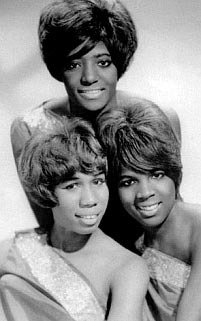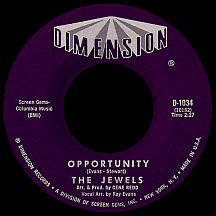THE JEWELS
Opportunity
Keeping track of all the singing groups that called themselves The Jewels would be daunting, but I can at least single out a few that made a mark (if sometimes slight) on the music business. An R&B group with that name (on the R and B label!) recorded "Hearts of Stone" in 1954 and it was popular in a number of radio markets, particularly on the west coast. Jerry Wallace's 1958 hit "Primrose Lane" featured backing vocals by a Jewels group and the following year a doo wop act with the name recorded "Pearly Mae," which was a minor hit in Pittsburgh. In 1963, Billy Abbott's "Groovy Baby" had backing by the Jewels, who were actually The Tymes using a pseudonym. There are others, but for the moment I'd like to focus on The Jewels of Washington, D.C., whose 1964 hit "Opportunity" remains unheard by many but is cherished by others.
Sandra Bears, Grace Ruffin, Margie Clark and Carrie Mingo formed the act at Theodore Roosevelt High School around 1960 as The Impalas, a name already in use by the male quartet from Brooklyn that had sold a million copies of "Sorry (I Ran All the Way Home)" in '59. A change was inevitable, but not before the girls waxed one single as the Impalas for Checker Records in 1961. The events leading up to this debut disc involve James "Smokey" McAllister, who became their manager, and Grace's cousin, Billy Stewart, a pianist for Bo Diddley destined to be a hitmaker in his own right. "For the Love of Mike" resulted, then they did backing vocals on "Reap What You Sow," Stewart's breakthrough 1962 hit on Chess. The girls became The Four Jewels (little did they realize a male vocal group by that name had backed up pop singer Gloria Wood on her 1956 single for Diamond Records, "The Rock and the Roll") and recording at Chicago's Chess studio seemed to give them a better shot at success; there were singles on the Start label (including a ballad, "Loaded With Goodies," and the hotter "Fire") and Checker efforts like "That's What They Put Erasers on Pencils For," which was a hit in Baltimore in early '64.
Carrie quit the group and was replaced by another former Roosevelt student, Martha Harvin. Margie took a leave of absence, so they shortened the name to the Jewels; the act was a trio when they recorded "Opportunity," a great track written by pop songwriting superstar Ray Evans and onetime Fiestas singer Randy Stewart and produced by Gene Redd, whose biggest success up to that time was Charles Brown's holiday megahit "Please Come Home for Christmas." McAllister, who'd been working with Sue Records duo The Soul Sisters ("I Can't Stand It"), suddenly had two breaking female groups, as the Jewels finally hit the charts in '64 with their song, its lyrics taking a point of view uncommon in popular music: lead singer Sandra makes a plea for a fallen friend in need of a break ('...he's my, my baby...') who'd '...let success...go straight to his head.'

The Dimension Records single barely made a blip on the eastern U.S. radar, but in October it came on strong in Los Angeles, quickly developing as a major Southern California hit, going top five in San Diego and San Bernardino as well as in the City of Angels. A minor name snafu ensued: a group billed as Jenny and the Jewels did a soundalike version of "Baby Love" for the budget label Hit (The Supremes' Motown smash, coincidentally, being the L.A. chart-topper that held "Opportunity" at number two for two weeks on KRLA's Tune-Dex survey). While the Jewels' single was establishing itself in the southwest corner of the country as one of 1964's biggest non-Beatles hits, Sandra and her group found themselves busy performing the song (which spent several weeks on the Billboard and Cash Box charts) for live audiences. An appearance at Harlem's Apollo Theater impressed James Brown so much that he hired the teenage girls (a quartet again by that time) to go on tour as part of his spectacular show (pending parental consent, which they got).
A remake of Clarence "Frogman" Henry's "But I Do" was the Dimension follow-up, but it went nowhere. Meanwhile, another unrelated Jewels record, "Jimmy Lee," with backing by Johnny and the Sparks, came out of Cincinnati on the Olimpic label...could even more random Jewels groups be in the offing? The "Opportunity" girls spent a year on the road with Butane James, who produced a single for them on his Dyna Mite label, "Papa Left Mama Holding the Bag," an answer to one of JB's most famous hits. About the time "This is My Story" (the decade-old Gene and Eunice tune), another Brown production, appeared by the Jewels on Federal in the fall of '66, yet another Jewels single with no connection to the D.C. group, a soulful take on "I'm Forever Blowing Bubbles," popped up on MGM (Bob Baskerville and his wife Peggy Jones, both former guitarists for Bo Diddley's band, were the responsible parties; she was once nicknamed "Lady Bo").
When The Jewels of our nation's capitol broke up around 1968, the news somehow missed making headlines. Grace Ruffin, Margie Clark and formidable, underrated lead singer Sandra Bears went on to lead far less glamorous lives, though they've been known to get together and perform from time to time. Harvin, on the other hand, changed her name to Martha High, made her own contribution to the late-'70s disco movement on the Salsoul label and continued performing, with and without James Brown, well into the 21st century.


